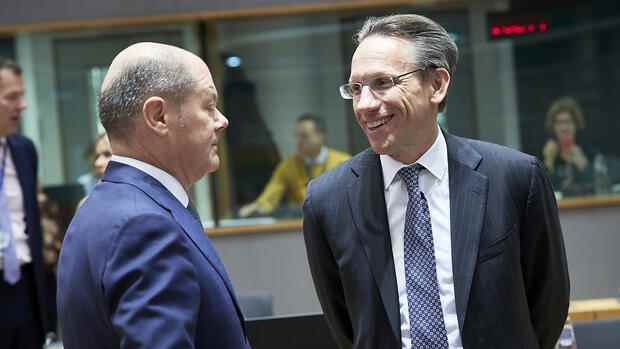Jörg Kukies has often been in the Ministry of Finance as Olaf Scholz’s deputy.
(Photo: dpa)
Brussels The traffic light coalition is arguing about the question of where the hundreds of billions of euros for investments with which Europe wants to become climate-neutral should come from. State Secretary Jörg Kukies (SPD) took a very clear stance against new rules that would allow the euro states additional debt in the name of the energy transition.
Reforming the rules for new debt is being discussed. One suggestion is to deduct the expenses for the energy transition. This would prevent the debt rules from slowing down the restructuring of the energy supply.
Kukies said: “I am very skeptical about these golden rules.” The discussion about the EU taxonomy, a classification system for the financial market, has shown that it is not possible to objectively define what is “green” and what is not. Kukies is considered a confidant of Chancellor Olaf Scholz (SPD). In the Chancellery, he heads the Departments of Economics and Finance as well as European Policy.
The Greens react to his advance with incomprehension. The chairman of the German Green MEPs in the European Parliament, Rasmus Andresen, told the Handelsblatt: “If that is the position of the Chancellery in negotiations with other governments, that would be a breach of word.” Andresen added: “Especially from the social democratic side, I would would like more support for a future-oriented and investment-friendly solution.”
Top jobs of the day
Find the best jobs now and
be notified by email.
In the coalition agreement, the parties have stated that they want a “further development” of the fiscal policy rules of the euro zone. One of the aims should be to ensure sustainable and climate-friendly investments.
Calculate investments from the new borrowing
Appropriate proposals have been discussed in Brussels for several months. In this way, investments in the energy transition could be deducted from the new debt before the criteria of the Stability and Growth Pact are applied.
This stipulates that the new debt of the euro countries may only amount to three percent of the GDP – too little to master the challenges of the next few years, say the countries France, Spain and Italy, among others.
However, Kukies categorically rejected such exceptions: “If you exempt certain expenses from the fiscal rules, you open Pandora’s box,” he warned at a panel discussion. The finance ministers could then come up with the idea of also excluding education spending or defense spending because they contribute to sustainable security.
The fiscal rules have been suspended since the beginning of the corona crisis and should apply again from the beginning of 2023. Kukies considers them flexible enough. With the quick provision of loans and the Corona recovery fund, the EU has shown that it is able to react.
>> Read here: Suddenly powerful – how the EU Commission directs the countries with corona billions
Andresen disagrees: “To simply say that the rules have worked is a weak attitude. It is true that the rules no longer played a role even before the corona crisis. ”There is no point in enforcing rules in need of reform against reason.
In addition to the three percent rule, another rule has been criticized, according to which the euro states may only have debts of 60 percent of their GDP. In 2020, the debt of four countries more than doubled.
More: The euro has survived a lot of criticism – and is still a debt burden

